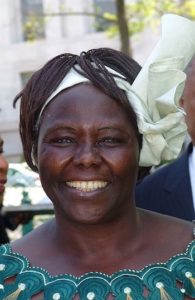
Wangarĩ Maathai
*Wangarĩ Maathai was born on this date in 1940. She was a Black Kenyan social, environmental justice, and political activist.
Wangarĩ Muta Maathai was born in Ihithe, Nyeri District, in the central highlands of Kenya. Her family is Kikuyu, the most populous ethnic group in Kenya, and has lived in the area for several generations. Around 1943, Maathai's family relocated to a white-owned farm in the Rift Valley, near Nakuru, where her father had found work.
In 1947, she returned to Ihithe with her mother, as two of her brothers were attending primary school in the village, and there was no schooling available on the farm where her father worked. Her father remained at the farm. Shortly afterward, she joined her brothers at Ihithe Primary School at eight. At 11, Maathai moved to St. Cecilia's Intermediate Primary School, a boarding school at the Mathari Catholic Mission in Nyeri.
Maathai studied at St. Cecilia's, became fluent in English, and converted to Catholicism. While there, she was sheltered from the ongoing Mau Mau uprising, which forced her mother to move from their homestead to an emergency village in Ihithe in 1956; she was then granted admission to the only Catholic high school for girls in Kenya, Loreto High School in Limuru.
As Kenya’s Independence approached, Kenyan politicians initiated what became known as the Kennedy Airlift or Airlift Africa. Maathai became one of some 300 Kenyans selected to study in the United States in September 1960. She received a scholarship to study at Mount St. Scholastica College (now Benedictine College) in Atchison, Kansas, where she majored in biology with minors in chemistry and German. After receiving her Bachelor of Science degree in 1964, she studied at the University of Pittsburgh for a master's degree in biology. Her graduate studies there were funded by the Africa America Institute. While in Pittsburgh, she first experienced environmental restoration when local environmentalists pushed to rid the city of air pollution.
In January 1966, Maathai received her MSc in biological sciences and was appointed as a research assistant to a professor of zoology at the University College of Nairobi. Upon returning to Kenya, Maathai dropped her forename, preferring to be known by her birth name, Wangarĩ Muta. When she arrived at the university to start her new job, she was informed that it had been given to someone else. Maathai believed this was because of gender and tribal bias. After a two-month job search, Professor Reinhold Hofmann, from the University of Giessen in Germany, offered her a job as a research assistant in the microanatomy section of the newly established Department of Veterinary Anatomy in the School of Veterinary Medicine at the University College of Nairobi.
In April 1966, she met Mwangi Mathai, another Kenyan who had studied in America and would later become her husband. She also rented a small shop in the city and established a general store where her sisters worked. 1967, at the urging of Professor Hofmann, she traveled to the University of Giessen in Germany to pursue a doctorate. She studied both at Giessen and the University of Munich. In the spring of 1969, she returned to Nairobi to continue her studies at the University College of Nairobi as an assistant lecturer. In May, she and Mwangi Mathai married. Later that year, she became pregnant with her first child, and her husband campaigned for a seat in Parliament, losing.
During the election, Tom Mboya, who had been instrumental in founding the program that sent her overseas, was assassinated. This led to President Kenyatta effectually ending multi-party democracy in Kenya. Shortly after, her first son, Waweru, was born. In 1971, she became the first Eastern African woman to receive a Ph.D., her doctorate in veterinary anatomy, from the University College of Nairobi, which became the University of Nairobi the following year. She completed her dissertation on the development and differentiation of gonads in bovines. Her daughter, Wanjira, was born in December 1971.
In 1977, Maathai founded the Green Belt Movement, an environmental non-governmental organization focused on planting trees, environmental conservation, and women's rights. 1984, she was awarded the Right Livelihood Award for "converting the Kenyan ecological debate into mass action for reforestation." Between January 2003 and November 2005, Maathai was an elected member of Parliament and served as assistant minister for Environment and Natural resources in the government of President Mwai Kibaki. She became the first black woman to be awarded the Nobel Peace Prize. She was an Honorary Councilor of the World Future Council. She was affiliated with professional bodies and received several awards. On September 25, 2011, Maathai died of complications from ovarian cancer.
Her passion for environmental justice can be summed up in the statement from her book: “Nothing is more beautiful than cultivating the land at dusk. At that time of day in the central highlands, the air, and the soil are cool, the sun is going down, the sunlight is golden against the ridges and the green of trees, and there is usually a breeze. As you remove the weeds and press the earth around the crops, you feel content and wish the light would last longer so you could cultivate more. Earth, water, air, and the sun's waning fire combine to form life's essential elements and reveal my kinship with the soil. As a child, I sometimes became so absorbed in working in the fields with my machete that I didn't notice the end of the day until it got so dark that I could no longer differentiate between the weeds and crops. At that point, I knew it was time to go home on the narrow paths that crisscrossed the fields, rivers, and woodlots.”